Neil Armstrong
Appearance
(Redirected from Neil A. Armstrong)

Neil Alden Armstrong (5 August 1930 – 25 August 2012) was an American test pilot and astronaut, who was the commander of the Apollo 11 Moon landing mission on July 20, 1969, in which he and Buzz Aldrin were the first humans to land on the Moon, and he was the first man to walk on the Moon.
Quotes
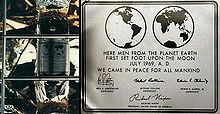
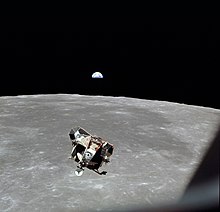
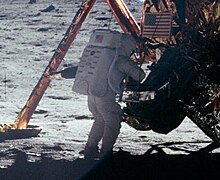
- I think we're going to the moon because it's in the nature of the human being to face challenges. It's by the nature of his deep inner soul ... we're required to do these things just as salmon swim upstream.
- Apollo mission press conference (1969); ABC World News; also quoted in Of a Fire on the Moon (1970) by Norman Mailer, and in First Man: The Life of Neil A. Armstrong (2005) by James R. Hansen
- Houston, Tranquility Base here. The Eagle has landed.
- First words from the Apollo 11 lunar module Eagle after guiding the craft to a landing on the Moon at 4:17pm EDT (20 July 1969)
- That's one small step for [a] man, one giant leap for mankind.
- Words said when Armstrong first stepped onto the Moon (20 July 1969) One Small Step, transcript of Apollo 11 Moon landing. In the actual sound recordings he apparently fails to say "a" before "man" and says: "That's one small step for man, one giant leap for mankind." This was generally considered by many to simply be an error of omission on his part. Armstrong long insisted he did say "a man" but that it was inaudible. Prior to new evidence supporting his claim, he stated a preference for the "a" to appear in parentheses when the quote is written. The debate continues on the matter, as "Armstrong's 'poetic' slip on Moon" at BBC News (3 June 2009) reports that more recent analysis by linguist John Olsson and author Chris Riley with higher quality recordings indicates that he did not say "a".
- I'm quite certain that we'll have such [lunar] bases in our lifetime, somewhat like the Antarctic stations and similar scientific outposts, continually manned.
- Through books you will meet poets and novelists whose creations will fire your imagination. You will meet the great thinkers who will share with you their philosophies, their concepts of the world, of humanity and of creation. You will learn about events that have shaped our history, of deeds both noble and ignoble. All of this knowledge is yours for the taking... Your library is a storehouse for mind and spirit. Use it well.
- Letter to the children of Troy, Michigan on the opening of its Public Library (1971), in Why Libraries Matter: Letters to the Children of Troy, Michigan (From 1971), by Lucas Reilly, Mental Floss (3 July 2012)
- I remember on the trip home on Apollo 11 it suddenly struck me that that tiny pea, pretty and blue, was the Earth. I put up my thumb and shut one eye, and my thumb blotted out the planet Earth. I didn't feel like a giant. I felt very, very small.
- As quoted in The People's Almanac (1975) by David Wallechinsky and Irving Wallace, p. 675
- I am comfortable with my level of public discourse.
- Declining to be interviewed for a magazine article, quoted in "Armstrong's Code" by Kathy Sawyer in Washington Post Magazine (11 July 1999)
- The exciting part for me, as a pilot, was the landing on the moon. That was the time that we had achieved the national goal of putting Americans on the moon. The landing approach was, by far, the most difficult and challenging part of the flight. Walking on the lunar surface was very interesting, but it was something we looked on as reasonably safe and predictable. So the feeling of elation accompanied the landing rather than the walking.
- Space has not changed but technology has, in many cases, improved dramatically. A good example is digital technology where today's cell phones are far more powerful than the computers on the Apollo Command Module and Lunar Module that we used to navigate to the moon and operate all the spacecraft control systems.
- On the differences between the present and the time of the space race which existed during the Cold War years, in an interview at The New Space Race (August 2007)
- Pilots take no special joy in walking: pilots like flying. Pilots generally take pride in a good landing, not in getting out of the vehicle.
- On his famous moonwalk, as quoted in In the Shadow of the Moon : A Challenging Journey to Tranquility, 1965-1969 (2007) by Francis French and Colin Burgess
- A century hence, 2000 may be viewed as quite a primitive period in human history. It's something to hope for. ... I am, and ever will be, a white-socks, pocket-protector, nerdy engineer — born under the second law of thermodynamics, steeped in the steam tables, in love with free-body diagrams, transformed by Laplace, and propelled by compressible flow. As an engineer, I take a substantial amount of pride in the accomplishments of my profession.
- "The Engineered Century" remarks delivered during National Engineers Week on behalf of the National Academy of Engineering at the National Press Club (22 February 2000)
- Thank you, Mr. Chairman. I am in the position of a pilot without his checklist, so I'll have to wing it a bit. ... [Prior to the Apollo missions,] no one knew what kind of person could be persuaded to take the trip. Prisoners were suggested. Soldiers could be ordered. Photographers could take pictures — and they're expendable. Doctors understood the limits of human physiology. Finally, both sides picked pilots.
- On being awarded a Congressional Gold Medal on (21 July 2009)
- I'll not assert that it was a diversion which prevented a war, but nevertheless, it was a diversion.
- Apollo 11 40th anniversary celebration (2009), Armstrong discussed how the space race functioned politically Neil Armstrong's Giant Leap, by Chris Higgins, in Mental Floss (25 August 2012)
Presidential telephone call (1969)

- US President Richard Nixon spoke to Aldrin and Armstrong during their walk on the surface of the moon (20 July 1969) - Full transcript and link to the recording
- Nixon: Hello, Neil and Buzz. I'm talking to you by telephone from the Oval Room at the White House, and this certainly has to be the most historic telephone call ever made from the White House. I just can't tell you how proud we all are of what you have done. For every American, this has to be the proudest day of our lives. And for people all over the world, I am sure that they, too, join with Americans in recognizing what an immense feat this is. Because of what you have done, the heavens have become a part of man's world. And as you talk to us from the Sea of Tranquility, it inspires us to redouble our efforts to bring peace and tranquility to Earth. For one priceless moment in the whole history of man, all the people on this Earth are truly one; one in their pride in what you have done, and one in our prayers that you will return safely to Earth.
- Armstrong: Thank you, Mr. President. It's a great honor and privilege for us to be here representing not only the United States but men of peace of all nations, and with interests and the curiosity and with the vision for the future. It's an honor for us to be able to participate here today.
- Nixon: And thank you very much and I look forward — all of us look forward to seeing you on the Hornet on Thursday.
- Aldrin: I look forward to that very much, sir.
60 Minutes interview (2005)
- Our autopilot was taking us into a very large crater, about the size of a big football stadium with steep slopes on the crater covered with very large rocks about the size of automobiles that was not the kind of place that I wanted to try to make the first landing.
- I thought, well. when I step off it's just going to be a little step — a step from there down to there — but then I thought about all those 400,000 people who had given me the opportunity to make that step and thought it's going to be a big something for all those folks and, indeed for a lot of others that weren't even involved in the project, so it was kind of a simple correlation.
- On what inspired him to say his famous words, "That's one small step for [a] man, one giant leap for mankind."
- It's a brilliant surface in that sunlight.
- The horizon seems quite close to you because the curvature is so much more pronounced than here on Earth.
- It's an interesting place to be. I recommend it.
- Friends and colleagues all of a sudden looked at us, treated us, slightly differently than had months or years before when we were working together. I never quite understood that.
- I guess we all like to be recognized not for one piece of fireworks but for the ledger of our daily work.
40th anniversary of the Apollo 11 landing (2009)
- 40th anniversary of the Apollo 11 landing - Personal tribute letter to Australians and Honeysuckle Creek Canberra Deep Space Communications Complex, which provided the communications between Apollo 11 and mission control]
- We were involved in doing what many thought to be impossible, putting humans on Earth's moon.
- Science fiction writers thought it would be possible. H. G. Wells, Jules Verne, and other authors found ways to get people to the moon. But none of those writers foresaw any possibility of the lunar explorers being able to communicate with Earth, transmit data, position information, or transmit moving pictures of what they saw back to Earth. The authors foresaw my part of the adventure, but your part was beyond their comprehension.
- All the Apollo people were working hard, working long hours, and were dedicated to making certain everything they did, they were doing to the very best of their ability.
- It would be impossible to overstate the appreciation that we on the crew feel for your dedication and the quality of your work.
Open letter on NASA cuts (2010)
- Open letter with James Lovell and Eugene Cernan to U.S. President Barack Obama "Moon Men To Obama: Your Nasa Plans Suck Asteroids" by Kit Eaton in Fast Company (14 April 2010)
- For The United States, the leading space faring nation for nearly half a century, to be without carriage to low Earth orbit and with no human exploration capability to go beyond Earth orbit for an indeterminate time into the future, destines our nation to become one of second or even third rate stature. While the President's plan envisages humans traveling away from Earth and perhaps toward Mars at some time in the future, the lack of developed rockets and spacecraft will assure that ability will not be available for many years.
Without the skill and experience that actual spacecraft operation provides, the USA is far too likely to be on a long downhill slide to mediocrity. America must decide if it wishes to remain a leader in space. If it does, we should institute a program which will give us the very best chance of achieving that goal.
Letter to Robert Krulwich (2010)
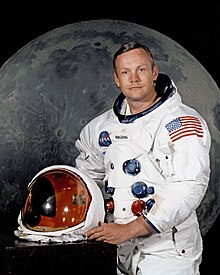
- Letter to Robert Krulwich after he wondered in his columns why the astronauts stayed so close to the landing site Neil Armstrong Talks About The First Moon Walk, by Robert Krulwich at NPR (8 December 2010)
- It is true that we were cautious in our planning. There were many uncertainties about how well our Lunar module systems and our Pressure suit and backpack would match the engineering predictions in the hostile lunar environment. We were operating in a near perfect vacuum with the temperature well above 200 degrees Fahrenheit with the local gravity only one sixth that of Earth. That combination cannot be duplicated here on Earth, but we tried as best we could to test our equipment for those conditions. For example, because normal air conditioning is inadequate for lunar conditions, we were required to use cold water to cool the interior of our suits. We did not have any data to tell us how long the small water tank in our backpacks would suffice. NASA officials limited our surface working time to 2 and 3/4 hours on that first surface exploration to assure that we would not expire of hyperthermia.
- There was great uncertainty about how well we would be able to walk in our cumbersome pressurized suit.
- Preflight planners wanted us to stay in TV range so that they could learn from our results how they could best plan for future missions. I candidly admit that I knowingly and deliberately left the planned working area out of TV coverage to examine and photograph the interior crater walls for possible bedrock exposure or other useful information.
- Later Apollo flights were able to do more and move further in order to cover larger areas, particularly when the Lunar Rover vehicle became available in 1971.
- During my testimony (to the House Science and Technology Committee) in May I said, “Some question why Americans should return to the Moon. “After all,” they say “we have already been there.” I find that mystifying. It would be as if 16th century monarchs proclaimed that “we need not go to the New World, we have already been there.” Or as if President Thomas Jefferson announced in 1803 that Americans “need not go west of the Mississippi, the Lewis and Clark Expedition has already been there.” Americans have visited and examined 6 locations on Luna, varying in size from a suburban lot to a small township. That leaves more than 14 million square miles yet to explore.
Misattributed
- I believe that every human has a finite number of heartbeats. I don't intend to waste any of mine running around doing exercises.
- First On The Moon : A Voyage with Neil Armstrong, Michael Collins, Edwin E Aldrin, Jr. (1970) edited by Gene Farmer and Dora Jane Hamblin, p. 113, states of this: "Like many a quote which gets printed once and therefore enshrined in the libraries of all newspapers and magazines, this particular one was erroneous. Neil recalled having heard the quote, and he even recalled having repeated it once. He did not subscribe to its thesis, however, and he only quoted it so that he could disagree with it."
Quotes about Armstrong
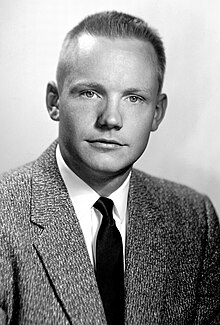
- Sorted alphabetically by author or source

- Neil Armstrong was also a reluctant American hero who always believed he was just doing his job. He served his Nation proudly, as a navy fighter pilot, test pilot, and astronaut. He remained an advocate of aviation and exploration throughout his life and never lost his boyhood wonder of these pursuits.
- Armstrong family statement regarding his death, as quoted by ABC News (25 August 2012)
- I am deeply saddened by the passing of my good friend, and space exploration companion, Neil Armstrong today. As Neil, Mike Collins and I trained together for our historic Apollo 11 Mission, we understood the many technical challenges we faced, as well as the importance and profound implications of this historic journey. [...] Whenever I look at the Moon I am reminded of that precious moment, over four decades ago, when Neil and I stood on the desolate, barren, yet beautiful, Sea of Tranquility, looking back at our brilliant blue planet Earth suspended in the darkness of space, I realized that even though we were farther away from Earth than two humans had ever been, we were not alone. Virtually the entire world took that memorable journey with us. I know I am joined by many millions of others from around the world in mourning the passing of a true American hero and the best pilot I ever knew. My friend Neil took the small step but giant leap that changed the world and will forever be remembered as a historic moment in human history.
- As long as there are history books, Neil Armstrong will be included in them, remembered for taking humankind's first small step on a world beyond our own. [...] Besides being one of America's greatest explorers, Neil carried himself with a grace and humility that was an example to us all. When President Kennedy challenged the nation to send a human to the Moon, Neil Armstrong accepted without reservation. As we enter this next era of space exploration, we do so standing on the shoulders of Neil Armstrong. We mourn the passing of a friend, fellow astronaut and true American hero.
- He was the best, and I will miss him terribly.
- Michael Collins, Apollo 11 command module pilot; NASA obituary (25 August 2012)
- As the first human to land on any world outside the Earth, and probably the first living creature of any sort to come from the Earth and reach the Moon, his legacy will be safe as long as intelligent life survives in this corner of the cosmos.
- You got a bunch of guys about to turn blue. We're breathing again.
- Charlie Duke, capcom of mission control in Houston, after the announcement that the Eagle had landed. Over 30 seconds earlier a previous message from Houston had been an indication that there was 30 seconds of fuel left in the landing vehicle.
- His achievements were the stuff of legend, and I am lucky to have known him, if only for a brief time, I am sad that he's gone, proud as a member of the human race that he did what he did for all of us.
- Some years ago, I was lucky enough invited to a gathering of great and good people: artists and scientists, writers and discoverers of things. And I felt that at any moment they would realise that I didn't qualify to be there, among these people who had really done things. On my second or third night there, I was standing at the back of the hall, while a musical entertainment happened, and I started talking to a very nice, polite, elderly gentleman about several things, including our shared first name. And then he pointed to the hall of people, and said words to the effect of, "I just look at all these people, and I think, what the heck am I doing here? They’ve made amazing things. I just went where I was sent." And I said, "Yes. But you were the first man on the moon. I think that counts for something." And I felt a bit better. Because if Neil Armstrong felt like an imposter, maybe everyone did.
- Many short-sighted fools think that going to the Moon was just a stunt. But the astronauts knew the meaning of what they were doing, as is shown by Neil Armstrong's first words in stepping down onto the soil of Luna: "One small step for a man, one giant leap for mankind."
- Robert A. Heinlein, The Pragmatics of Patriotism (1973)
- Better if he had said something natural like, "Jesus, here we are."
- Edmund Hillary, The Sunday Times [London] (21 July 1974)
- Among the greatest of American heroes — not just of his time, but of all time.
- At few other moments has one person become the fulcrum of such weighty imperatives — to win a famous victory for America and vindicate a vast investment of national treasure, to penetrate a hostile frontier, to master a new technology, to navigate a harrowing descent to the unknown — all in the glare of rapt global attention. By the time he landed in the Sea of Tranquility, the country boy from Ohio had already spent most of his adult life in jobs where intensity of focus and the threat of violent death were part of his daily routine. He was used to all of that. It was, instead, the loss of privacy that appalled him. He loved to fly, and he loved his country, and in the name of those passions he was willing to risk not only his hide but a piece of his soul. Only a piece, however — a mere finger's worth — and no more. ... Those who know him say he is a smart and intensely private, even shy, man determined to live life on his own terms despite having floated down that ladder into the public domain. Whether as an astronaut, naval combat aviator, test pilot, civil servant, engineer, absent-minded professor, gentleman farmer, businessman, civic booster, amateur musician, husband or father, Neil Armstrong has followed his own code.
- Kathy Sawyer in "Armstrong's Code" in Washington Post Magazine (11 July 1999)
External links
- Official NASA Biography
- Neil Armstrong Air and Space Museum
- Discussion of the "small step" quote phrasing
- 2003 Armstrong Interview
- Article on Armstrong's Autobiography
- Article on opening of Armstrong Museum
- National Press Club Audio and transcript from 2000 appearance
- "Armstrong 'got Moon quote right'" (2 October 2006) (BBC)



